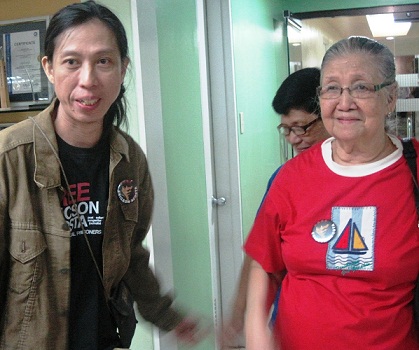Text and photos by ELIZABETH LOLARGA
FORMER University of the Philippines Collegian Editor Ericson “Eric” Acosta, political prisoner under the democratically elected Aquino administration, flew back safely to Manila early Friday after close to two years of detention at a Samar sub-provincial jail.
He was immediately taken to the National Kidney Institute for renal treatment in Quezon City.
Up to late the Thursday night in Calbayog City, the office of Gov. Mila Tan and provincial jail warden Victor Templonuevo tried to delay the conditional release of Acosta.
The same warden tried to also stall the release by first demanding that two more jail guards escort Acosta to the NKI.. Then he demanded that the accompanying party wait for proper travel and mission orders for the escorts to come from Catbalogan, which is 72.5 kms away.
Chief Persida Rudea Acosta (not related to the detainee) of the Public Attorney’s Office (PAO) scolded Templonuevo over the phone, reminding him that the the judiciary is above any local government executive or a military commander. Thus, the ruling in favor of Acosta could not be overturned by a governor or even a general.
Despite her insistence on the rule of law, her staff, young Acosta, some members of media and a human rights organization learned in the nick of time that as they boarded the plane to leave, the military had sent from Catbalogan City two six-by-six trucks full of soldiers to stall Acosta’s conditional release for health reasons.
Acosta, in prison since Feb. 13, 2011, has chronic nephritis. PAO’s Dr. Erwin Erfe said he and Rueda-Acosta have interceded for Acosta because he needs immediate check-up, treatment and confinement at a specialist hospital like the Kidney Center. Otherwise, prolonged imprisonment would put Acosta in danger of “suffering from renal failure that could lead to dialysis and a shorter life,” the medico-legal consultant said.
In a press conference last night with local media, Rueda-Acosta said “Aanhin pa ang damo, kung patay na ang kabayo? In other words, we need Eric healthy and alive so he can stand trial, even if I have to temporarily represent him so he can defend himself. Let him have his day in court. Don’t deprive him of due process.”
Judge Feliciano P. Aguilar of the Regional Trial Court in Gandara, Samar, decided to release Acosta for the check-up. Rueda-Acosta clarified that young Acosta’s release is temporary, adding, “He is not yet free to go home. He still has to face trial.” She said she was in favor of asking the Supreme Court to move the trial venue moved to Metro Manila, not in Samar.
She said she had read his blogs, her own children had prodded her to see what she could do for the man charged with illegal possession of firearms. His wife, Kerima, had also written to her twice for help.
After her first meeting with Acosta Thursday morning, she came away with the impression that “he’s an idealistic young man who sincerely wants social change, a truthful and real economic development. His over-enthusiasm in airing grievances of small farmers and marginalized urban dwellers has been misconstrued for something else. He needs to get initial justice.”
As for having him brought to a NKI, she said her action is consistent with the Philippines remaining a signatory since 1957 of the United Nations standards on the treatment of prisoners. She quoted Nelson Mandela of South Africa who said a nation could be judged by the situation of its prisons.
A pale, wan Acosta recalled how he drew strength and inspiration from Mandela’s example recounted in the autobiography The Long Walk to Freedom. Still stark in his mind were Jun Cruz Reyes’s unconventional biography of poet-dramatist Amado Hernandez, Shame by Salman Rushdie and Assata Shakur’s memoirs.
Acosta described Shakur as an American Black Panther freedom fighter jailed under cruel conditions for murder and who escaped to seek sanctuary in Cuba where she lives today.
He said detention made him appreciate liberty anew: “I was the erstwhile ‘documentor’ of human rights violations who experienced in theory and in concrete experiences the clear defects in our justice system.”
During his imprisonment with murderers, swindlers and drug pushers, he found out that most were of peasant origins. He tutored them in reading, writing and learning their rights. He served like a paralegal, reading and explaining legal documents to them.
Rueda-Acosta said her actions in his behalf were borne out of a belief in “helping those who must be helped so they receive humane treatment.”
Her advice to him and other idealistic youth is: “Pray hard, do good while recognizing one isn’t perfect, believe in enchantment and fairy tales which can happen in real life.” The way 24 hours in Calbayog, Samar, did.
